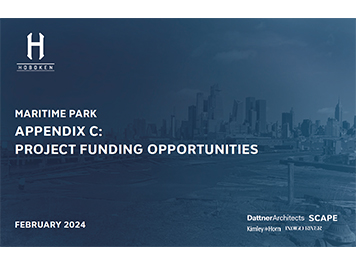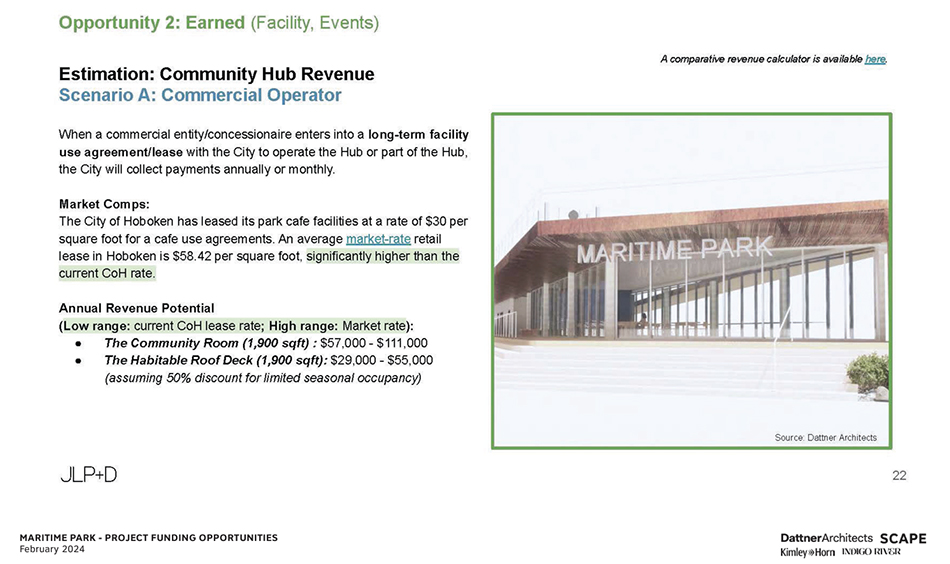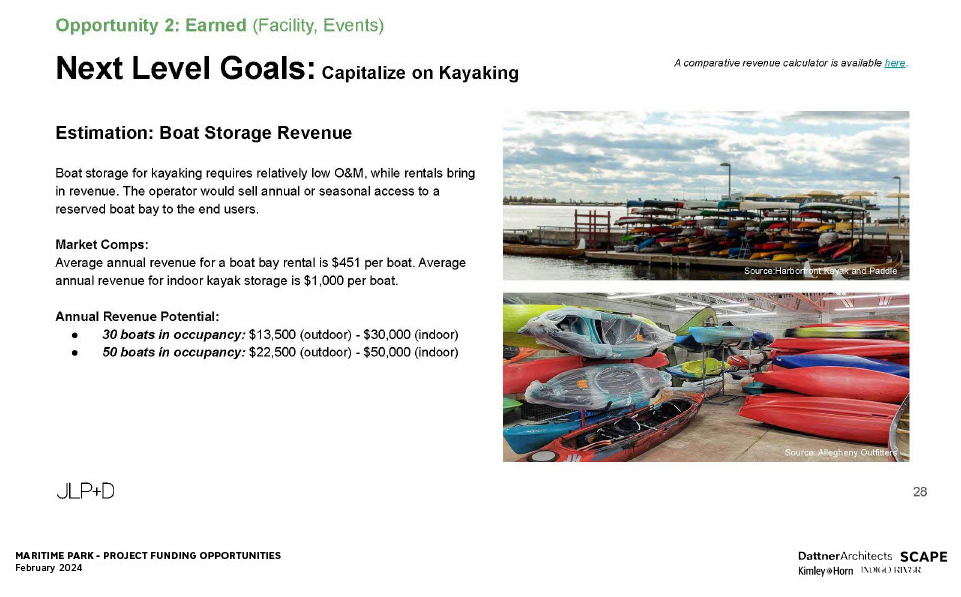Leasing the Community Hub building to a commercial operator would trigger the referendum requirement
Proposal to “Capitalize on Kayaking” conflicts with the mission of the free 20-year-old kayaking program that serves thousands each summer
FBW | March 4, 2024
By leasing the Community Hub building proposed for Maritime Park, the City of Hoboken could generate up to $111,000 in annual revenue for the community room and $55,000 for the roof deck. The City could also “Capitalize on Kayaking”, generating annually up to $77,500 for boat storage and $18,000 through kayak and canoe rentals.
These proposals are contained in Appendix C, Maritime Park Funding Opportunities, prepared by James Lima Planning + Development, in the final report submitted by Dattner Architects and its partners. The Funding Opportunities report proposes monetizing Maritime Park further with lawn areas for pay-to-play soccer, softball and volleyball; fees for birdwatching tours; and rental of the beach area.
These proposals fly in the face of the Fund for a Better Waterfront’s (FBW) decades-long advocacy for a truly public space at the water’s edge, open and free to all. To comply with the City’s Open Space Trust Fund (OSTF) ordinance, leasing the Community Hub building to a private operator would require approval by Hoboken voters, a right that FBW recently bolstered through its settlement with the City of Hoboken.
In response to the “Capitalize on Kayaking” proposal, Oscar Hernandez, a Hoboken Cove Community Boathouse (HCCB) board member, declared, “It certainly is against our mission. It also creates a lot of liability. There is a reason why no one offers storage, just paid tours. It’s not a lake.” For 20 years, the all-volunteer HCCB has offered free kayaking opportunities to people throughout the region, operating from the beach area of Maxwell Place Park, directly north of the Maritime Park site. Experienced HCCB members ensure safe and carefully supervised kayaking in the Hudson River, known for its strong currents and tides and frequent ferry traffic. HCCB currently serves up to 4,000 people annually.
If the City obtains State of New Jersey Green Acres funding to help pay for the construction of Maritime Park, the proposals to monetize could also run afoul of state restrictions. Any lease would be subject to NJDEP approval and must comply with public access requirements.
In response to the Maritime Park community surveys offered up by Dattner and Scape Studio, most people supported the proposed Community Hub structure, assuming it would be a public building and that kayak storage would supplement the ever-expanding free program of the HCCB. FBW assumed that the lawn areas, similar to Pier A Park, would be free and not subject to pay-to-play recreation activities.
FBW was founded on the premise that the water’s edge belongs to the public. In FBW’s 34-year history, it has thwarted many attempts to privatize the land on the river side of Sinatra Drive. Over the past six years, our entire community, along with Mayor Bhalla, has united in a hard-fought battle to secure the Union Dry Dock property for use as a public park.
Last October, Dattner Architects and Scape Studio submitted a final design for this park. Their final report, submitted in February, included cost estimates to build the park totaling $74.5 million. This raises the question: were the revenue-generating proposals driven by the high cost of the park design?
FBW has taken numerous steps to ensure the Maritime Park site is protected as public open space. This past October, FBW filed a motion to intervene in City of Hoboken vs. Port Imperial Marine Services. The following month FBW withdrew its motion after reaching a settlement with the City that preserves the public’s right to a referendum on the future sale or lease of properties acquired with the City’s OSTF, including any new lease granted at the dry dock site.
The settlement with FBW also requires the City to amend the deed to include language that the Union Dry Dock site was acquired with funding from the City’s OSTF. The OSTF ordinance states that funds for the acquisition of lands are “exclusively for recreation and conservation purposes.”
Related Docs
Appendix C: Project Funding Opportunities
Appendix D: Maritime Park Cost Report
Related Links
Can the City of Hoboken afford the $74.5 million price tag to build Maritime Park?
Judge Jablonski signs Consent Order that grants City of Hoboken clear title to Dry Dock
FBW and Hoboken reach a settlement upholding the right to referendum on future sale or lease
Elaborate landscape design unveiled for Maritime Park at the former Union Dry Dock site
Waterfront Promenade Approach for a park at Union Dry Dock ranks first in public survey
The unique protected inlet at the Weehawken Cove could meet the needs of paddlers
Dattner and SCAPE present three approaches for a park design at the Union Dry Dock site
Over 1700 people respond to survey, providing input for a park at Union Dry Dock
Hoboken Council approves 5-year lease for Union Dry Dock
Hoboken gains title to the Union Dry Dock property and initiates plans for a public park
After a contentious, multi-year battle, City will acquire Union Dry Dock



